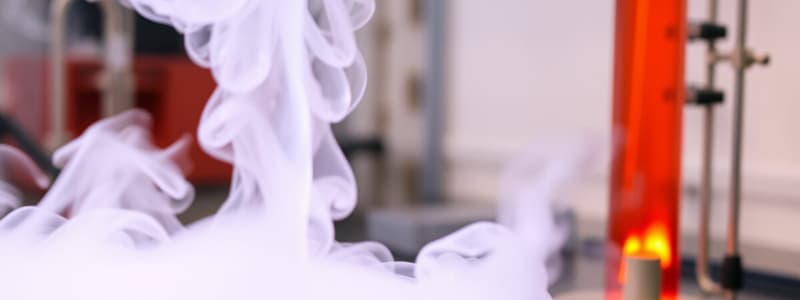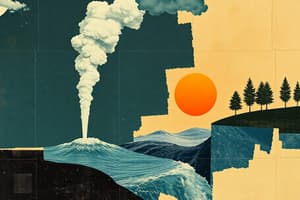Podcast
Questions and Answers
What is vaporization?
What is vaporization?
- The condensation of vapor into a solid.
- The transformation of a solid into a liquid.
- The process of becoming a suspension of particles in the air. (correct)
- The method of lowering the temperature of a liquid.
Which of the following best describes a suspension of particles?
Which of the following best describes a suspension of particles?
- Particles that are evenly distributed throughout a solution.
- Particles that have formed a crystalline solid.
- Particles that are completely dissolved in a liquid.
- Particles that float within a fluid and are not settled. (correct)
Which of these processes does not involve vaporization?
Which of these processes does not involve vaporization?
- Drying clothes in an open air.
- Boiling water to steam.
- Evaporating perfume into the atmosphere.
- Melting ice to form water. (correct)
How does vaporization typically occur?
How does vaporization typically occur?
In what state of matter is vaporization most commonly observed?
In what state of matter is vaporization most commonly observed?
Flashcards are hidden until you start studying
Study Notes
Vaporization Overview
- Vaporization is the process where a substance transitions from a liquid to a gas.
- It can occur through two primary processes: evaporation and boiling.
Characteristics of Suspensions
- A suspension contains solid particles dispersed throughout a liquid or gas.
- In suspensions, particles are typically larger and can settle over time, differentiating them from solutions.
Non-Vaporization Processes
- Processes such as condensation and solidification do not involve vaporization.
- These processes represent transitions in the opposite direction, from gas to liquid or liquid to solid, respectively.
Mechanisms of Vaporization
- Vaporization occurs when molecules gain enough energy to overcome intermolecular forces.
- Factors influencing vaporization include temperature, pressure, and surface area of the liquid.
Common States of Matter During Vaporization
- Vaporization is most commonly observed in the liquid state of matter.
- It is a key process in various phenomena, including water boiling and drying of wet surfaces.
Studying That Suits You
Use AI to generate personalized quizzes and flashcards to suit your learning preferences.




